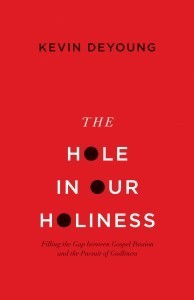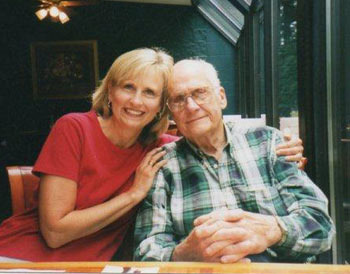Randy Alcorn's Blog, page 205
December 3, 2012
Discovering The Hole in Our Holiness
 Kevin DeYoung has a written a new book on an important topic, titled The Hole in Our Holiness: Filling the Gap between Gospel Passion and the Pursuit of Godliness. John Piper writes, “This book is vintage DeYoung—ruthlessly biblical.”
Kevin DeYoung has a written a new book on an important topic, titled The Hole in Our Holiness: Filling the Gap between Gospel Passion and the Pursuit of Godliness. John Piper writes, “This book is vintage DeYoung—ruthlessly biblical.”
Holiness was once a central component of following Christ. But for many today, the Christian life is little more than a celebration of cheap grace and pseudo-liberty, with a high tolerance for sin. In this well-written and much-needed book, Kevin DeYoung thoughtfully points us to an unpopular yet strangely liberating truth—that God is holy and expects us to be holy. With no hint of legalism or drudgery, Kevin offers a balanced and engaging view of law and grace. Kevin DeYoung is one of my favorite writers, and this book demonstrates why. I repeatedly said “Yes!” as I turned these pages. I’m convinced that Christ-followers desperately need to read, discuss, and live out the timely, God-exalting message of The Hole in Our Holiness.
In this 2-minute video, Kevin talks about why we should care about holiness:
Kevin DeYoung on Holiness from Crossway on Vimeo.
Here’s an excerpt from the first chapter:
I see a growing number of Christians today eager to think about creative ways to engage the culture. It’s not hard to find Christians fired up about planting churches and kingdom work. You can even find lots of believers passionate about precise theology. Yes and Amen to all that. Seriously. There’s no need to tear down what is good and true just because something else good and true may be missing. Jesus commended the churches in Revelation where they were faithful and then challenged them where they were in spiritual danger. I have no interest in making anyone feel bad for being passionate about Bach, bass fishing, or Herman Bavinck. There are a hundred good things you may be called to pursue as a Christian. All I’m saying is that, according to the Bible, holiness, for every single Christian, should be right at the top of that list. We need more Christians on our campuses, in our cities, in our churches, and in our seminaries who will say with Paul, “Look carefully then how you walk” (Eph. 5:15).
Is it possible that with all the positive signs of spiritual life in your church or in your heart, there is still a sad disregard for your own personal holiness? When was the last time we took a verse like, “Let there be no filthiness nor foolish talk nor crude joking, which are out of place, but instead let there be thanksgiving” (Eph. 5:4) and even began to try to apply this to our conversation, our movies, our YouTube clips, our television and commercial intake?
What does it mean that there must not be even a hint of immorality among the saints (v. 3)? It must mean something. In our sex-saturated culture, I would be surprised if there were not at least a few hints of immorality in our texts and tweets and inside jokes. And what about our clothes, our music, our flirting, and the way we talk about people who aren’t in the room? If the war on poverty is worth fighting, how much more the war on your own sin? The fact of the matter is, if you read through the instructions to the New Testament churches you will find few explicit commands that tell us to take care of the needy in our communities and no explicit commands to do creation care, but there are dozens and dozens of verses that enjoin us, in one way or another, to be holy as God is holy (e.g., 1 Pet. 1:13–16).
Let me say it again: I do not wish to denigrate any of the other biblical emphases capturing the attention of churches and Christians today. I know it makes a more exciting book if I say everyone else has missed the boat. That’s not the case, however. The sky is not falling, and it won’t until Jesus falls from it first. But we don’t have to pretend everything else is wrong to recognize we don’t have everything right. There is a gap between our love for the gospel and our love for godliness. This must change. It’s not pietism, legalism, or fundamentalism to take holiness seriously. It’s the way of all those who have been called to a holy calling by a holy God.
Randy
November 30, 2012
Hobby Lobby and Mardel Ordered to Provide Abortion Pill Coverage
 During the election season I addressed the issue of religious liberties and the implications the reelection of our President would have. I so much wish I was wrong about this. Here is a Christian businessman who owns Hobby Lobby and Mardel Christian bookstores, and employs thousands of staff. He is being ordered by the administration, and this has been upheld by a district judge, to violate his conscience by paying, via insurance, for his employees’ abortion-causing chemicals and procedures. Please pray for David Green, his company and their employees. And for the far-reaching implications of civil rights and religious liberties.
During the election season I addressed the issue of religious liberties and the implications the reelection of our President would have. I so much wish I was wrong about this. Here is a Christian businessman who owns Hobby Lobby and Mardel Christian bookstores, and employs thousands of staff. He is being ordered by the administration, and this has been upheld by a district judge, to violate his conscience by paying, via insurance, for his employees’ abortion-causing chemicals and procedures. Please pray for David Green, his company and their employees. And for the far-reaching implications of civil rights and religious liberties.
Judge: Hobby Lobby, Mardel must provide abortion pill coverage
Christian-owned-and-operated Hobby Lobby Stores and sister company, Mardel Christian & Education, didn't receive the outcome founder and CEO David Green wanted in yesterday's federal court case.
U.S. District Judge Joe Heaton ruled Nov. 19 that the Oklahoma City-based companies must provide the "morning after" and "week after" pills under new federal healthcare rules that begin Jan. 1. If they don't, the companies will face fines of up to $1.3 million per day.
"We disagree with this decision and we will immediately appeal it," said Kyle Duncan, general counsel for the Becket Fund for Religious Liberty. "Every American, including family business owners like the Greens, should be free to live and do business according to their religious beliefs. The Green family needs relief now, and we will seek it immediately from the federal appeals court in Denver."
The court did not question the fact that the family's beliefs forbid them from participating in abortion, but ruled that those beliefs were only "indirectly" burdened by the mandate's requirement that they provide free coverage for specific, abortion-inducing drugs in Hobby Lobby's self-funded insurance plan.
In a related health care case, Tyndale House Publishers received a favorable ruling last Friday, Nov. 16, which stopped enforcement of the Obama administration's abortion pill mandate for the Christian publisher.

November 28, 2012
Fiction Feeds Souls (Including Children’s)
As a fiction writer, and as a father and grandfather, this post by Nate Wilson resonated with me. I met Nate a while back at a Desiring God conference. He’s a good brother with a great point—the power of story, and the importance of saturating our children and grandchildren with the kind of stories that will, as Nate says, “Give them a taste for goodness, for truth, for beauty.”
Stories are Soul Food: Don't Let Your Children Hunger
By N. D. Wilson
My children have heard a lot of stories. Some have been made up on the fly (The Wilson Kid Adventures), some have involved hobbits, some apostles, some dwarves, and some have involved men caught up in horrible wars (their great grandfathers). My kids have heard stories about B-17 squadrons, and destroyers hitting mines, and their great grandmother’s dear friend, Corrie Ten Boom. They have heard stories about boys and about girls, about men and about women who faced the darkness armed with Light. They have heard true stories from history, and they have heard true stories that we call fiction. And I have been blessed to watch their young eyes sparkle with joy, and their young souls swell and grow with story food. Stories are more than amusement.
Do not fear those who can destroy the body — lions, armies, giants, kings, Balrogs, Caesars, large rats, or neighborhood bullies.
A Mistrust of Magic?
Bible-believing Christians frequently have a deep mistrust of fiction. In particular, they have a deep mistrust of, ahem, magic. This is impossible for me to understand, partly because I was weaned on C. S. Lewis and Tolkien, but more profoundly because I was marinated in Scripture at a very young age (by my parents). And Scripture is full of . . . stories. More than that, Scripture is full of the miraculous and the amazing. “Throw water on the altar,” Elijah says. “Fire will still fall from Heaven.” A famous shepherd boy takes down an infamous six-fingered giant. Don’t let the long-haired man near a jawbone. Collect the animals and build a boat. Whatever you do, don’t listen to that serpent.
Bible pop-quiz: Did Pharaoh’s magicians really turn staffs into snakes? (Hint: yes.)
Christians serve the Man who walked on water. We serve the Man who could not be kept in the belly of the great fish, the Man who shattered the grave, and all alone, ripped the city gates off a place called Death.
Loathe the Darkness and Love the Light
Christians believe that this world is so much more than a mechanical soulless machine. And yet, we tend to tell our children stories that (we hope) will only speak to their intellects. We want to give them a list of facts to tick off, like we’re trying to communicate a party platform to new recruits, like they’re nothing but brains ready for programming. We feed their souls sawdust and are surprised when they drift away to other cooks (with different tales about reality).
Kids (and adults) don’t just need the truth in their heads — they need it in their bones. They need to know what courage looks like and tastes like and smells like before they ever have to show it themselves. They need to do justly, and love mercy, and walk humbly — heroes and villains can show them why. They need to loathe the darkness and love the Light.
Feed Your Children
Feed your children stories that will keep their eyes wide with wonder when they look out their front windows or wander their yards. Feed them stories of joy and hardship and courage and tragedy and triumph. Give them heroes, real and imagined. Give them a taste for goodness, for truth, for beauty.
Yes, I’m prejudiced. I write fiction (yay, verily, even fantasy). But I’m not trying to provide the mechanical children of a mechanical universe with a much needed (false) daydream. I work to imitate this world; I hunt through the jungles of history and mythology looking for spices; I dig through the stories of the prophets looking for meat. I hope to write the fantasy of here, for the future heroes of here. I do what I can, hoping to feed souls.
N. D. Wilson is a best-selling novelist, screenwriter and essayist. His newest novel, released to critical acclaim, is Ashtown Burials I: The Dragon's Tooth (Random House), the first installment in a children's adventure/fantasy series. He can be found online at ndwilson.com or on Twitter (@ndwilsonmutters).

N.D. Wilson photo by by Mark LeMoreaux | child hand photo credit: apdk via photopin cc
From Eternal Perspective Ministries
Need Christmas gift ideas?
Check out EPM's gift guide for ideas for everyone on your list this Christmas! We offer gifts that will enlighten, inspire, encourage and even share the good news of Christ.
November 26, 2012
Challenge Those Who Value Tolerance to in Fact Be Tolerant
Our culture lives by a double standard. We place tolerance above all things, including truth. But those who consider themselves unyieldingly tolerant often prove to be decidedly intolerant. In particular, they are intolerant toward every person and idea that they, confident in their own appraisal, judge to be intolerant.
I love this suggestion in a blog post by Gregory Koukl with Stand to Reason:
Ask for Tolerance
If you’re placed in a situation where you suspect your convictions will be labeled intolerant, bigoted, narrow-minded, and judgmental, turn the tables. When someone asks for your personal views about a moral issue—homosexuality, for example—preface your remarks with a question.
You say: “You know, this is actually a very personal question you’re asking, and I’d be glad to answer. But before I do, I want to know if you consider yourself a tolerant person or an intolerant person. Is it safe to give my opinion, or are you going to judge me for my point of view? Do you respect diverse ideas, or do you condemn others for convictions that differ from yours?” Let them answer. If they say they’re tolerant (which they probably will), then when you give your point of view it’s going to be very difficult for them to call you intolerant or judgmental without looking guilty, too.
This response capitalizes on the fact that there’s no morally neutral ground. Everybody has a point of view they think is right and everybody judges at some point or another. The Christian gets pigeon-holed as the judgmental one, but everyone else is judging, too. It’s an inescapable consequence of believing in any kind of morality.

photo credit: pepo
From Eternal Perspective Ministries
Cyber Monday special: We're offering free shipping today only on every order from our online store when you use the discount code cybermonday2012 during check out.
Continental U.S. orders only. Offer good through Monday, November 26 at 11:59 p.m. PT.
Need Christmas gift ideas?Check out EPM's gift guide for ideas for everyone on your list this Christmas! We offer gifts that will enlighten, inspire, encourage and even share the good news of Christ.
November 23, 2012
Ollie Asks for a Reason to Anticipate Heaven
When I explained the premise of my book Heaven, my friend looked at me, incredulous. I rephrased my explanation using different Scriptures and illustrations and suddenly the light went on. He said, “I’ve never thought this way before. I don’t think many people have.”
Unfortunately, he’s right. Few have thought long and carefully about where they will spend eternity, and those who have given any thought at all to it often have notions that are popular in our culture but lack any biblical basis.
In this excerpt from my novel Deception, Detective Ollie Chandler looks to Jake and Clarence for a reason to anticipate Heaven:
“Why would anyone want to go to heaven? When my grandmother spoke about heaven, it was the last place I wanted to go. Who wants to be a ghost anyway? My idea of utopia was a place like earth, where you could have fun and ride bikes and play baseball and go deep into the forest and dive into lakes and eat good food.”
“Sounds to me like the new earth,” Clarence chimed in from the backseat.
“Exactly,” Jake said. “The Bible says the heaven we’ll live in forever will be a new earth, this same earth made new, without the bad stuff. God doesn’t give up on His original creation. He redeems it. And we’ll have these same bodies made better. The Bible teaches the exact opposite of what you’re saying—we won’t be ghosts. We’ll eat and drink and be active on a redeemed earth.”
“So you’ll still be Jake Woods?” I asked.
“Yeah—without the bad parts. We’ll be able to enjoy creation’s beauty and rule the world the way God intended us to. Baseball and riding bikes? Why not?”
“Wish I could believe that.”
“What’s stopping you?” Jake asked.

From Eternal Perspective Ministries
3-in-1 ebook available
Get Randy's three suspense detective novels (Deadline, Dominion and Deception) for the price of one in an eBook-exclusive omnibus. Available from Christianbook.com and other ebook sellers.
Need Christmas gift ideas?Check out EPM's gift guide for ideas for everyone on your list this Christmas! We offer gifts that will enlighten, inspire, encourage and even share the good news of Christ.
November 21, 2012
Giving Thanks Brings Happiness
 Happy Thanksgiving! We should never have to wonder what Thanksgiving is about. It’s all there in the name.
Happy Thanksgiving! We should never have to wonder what Thanksgiving is about. It’s all there in the name.
Psalm 100:4 says, “Enter his gates with thanksgiving, and his courts with praise! Give thanks to him; bless his name!”
The person who gives thanks learns to be thankful. And the thankful person is a happy person.
“Therefore, as you received Christ Jesus the Lord, so walk in him, rooted and built up in him and established in the faith, just as you were taught, abounding in thanksgiving” (Col. 2:6-7).
We live in a world under the curse. Not everything is good or easy. But if you look, you’ll see how much you have to be grateful for. Say thanks to God. And find others to say thanks to as well.
And remember, giving thanks brings happiness.

(Those reading by email will need to go to the blog to see the video greeting.)
November 19, 2012
The Least of These: Helping Those Suffering from HIV/AIDS
 How can we as Christians help the most vulnerable people in the world today? It’s a question I’ve asked in previous blogs, and this is another one.
How can we as Christians help the most vulnerable people in the world today? It’s a question I’ve asked in previous blogs, and this is another one.
Today’s post focuses on those who have contracted HIV/AIDS. According to the World Health Organization, HIV/AIDS is the world’s leading infectious killer, causing over 30 million deaths to date. Christians have a special responsibility (and privilege) to care for those affected, who are in desperate need of physical, financial, and emotional support—and most of all in need of the saving power of Jesus Christ.
In an editorial written for the Washington Post, Franklin Graham says Jesus is the model for how the church should respond to the HIV/AIDS crisis. I like Franklin, and I like his perspective that helps the needy without undercutting biblical truths (as even some Christian organizations have done):
by Franklin Graham, Samaritan’s Purse
In many ways today, HIV/AIDS has the same stigmas as leprosy did in Bible times. Leprosy was considered a death sentence. Victims were considered unclean and shunned by their families and communities. Yet, Jesus reached out to them, touched them, loved them, and healed them. This is the perfect representation of how the church should respond to people living with HIV/AIDS.
Samaritan’s Purse, the organization I have the privilege of leading, has been helping victims of this deadly virus since the 1980s. In 2002 in Washington, D.C., we organized an unprecedented global conference on the Christian response to HIV/AIDS. Much like this week’s AIDS 2012 conference in Washington, we brought together Christian leaders, political leaders, medical researchers and grassroots workers from 87 countries to discuss the issue and hear from people whose lives had been devastated by HIV/AIDS.
One of our speakers was Sen. Jesse Helms. I remember when he first called me to talk about AIDS, he felt that it was a homosexual disease and that federal money should not be used to help those who were infected. I pointed him to Scripture where Jesus was always full of compassion, even if a person’s sin had caused their circumstances. Instead of asking the sinner what he did wrong, Jesus as the Son of God, used his power to heal their bodies—telling the person to go and sin no more.
Senator Helms soon reversed his position. At our conference, he said, “I think it’s about time that I made a confession that I’ve been too lax too long in doing something really significant about AIDS. It’s been the kind of thing you can lay aside in your agenda. But I tell you, I’m not going to lay it aside on my agenda for the remaining months that I have in the United States Senate. You can’t avoid the seriousness of AIDS or HIV, whether it is in Africa or the United States. The treachery is the same. And the treachery is ignoring it.” Senator Helms became a strong, compassionate voice in the fight against the spread of HIV, and he was committed to getting federal funding to help those suffering from AIDS.
Unfortunately, there is still no cure for HIV/AIDS. But researchers have developed antiretroviral medications that can suppress the virus to the point where victims can now add years to their lives. It’s important that we make that help available to as many people as possible.
As the United States, United Nations and other organizations invest billions of dollars in the fight against HIV/AIDS, it’s crucial that they work with churches and faith-based organizations. In much of the developing world and particularly in sub-Saharan Africa, no other institution has more influence than the local church. Former President George W. Bush recognized this, and I am glad to see that he is a keynote speaker at AIDS 2012. The President’s Emergency Plan for AIDS Relief (PEPFAR), launched in 2003, was a landmark in the international response to AIDS—not only because of the unprecedented funding, but also because it involved faith-based organizations in the grass-roots implementation of programs. Starting with PEPFAR, Samaritan’s Purse has reached 1.25 million people with information on how to prevent the spread of HIV. We’ve also provided 200,000 with HIV testing and counseling.
We need an army of young Christians who are willing to go to the remote areas in this world and show compassion and God’s love. We need to tell those suffering that no matter what they have done in life, God still loves them and He will forgive them. Like Senator Helms said, the treachery is in ignoring it.
It is vital that churches and the Christian community continue to work together to inform people of the truth about how HIV spreads. Education about abstinence and marital faithfulness has proven to be extremely effective. For example, a two-year study by Johns Hopkins University of Samaritan’s Purse HIV/AIDS programs in Mozambique found that abstinence among young females rose from 34 to 49 percent after they received information about how HIV/AIDS is contracted. Every percentage point represents many young women who have made positive decisions to avoid behavior that could put them at risk of HIV.
I am not an advocate of passing out condoms to fight the spread of HIV/AIDS. We should not condone sex outside of marriage. When a crowd dragged the adulterous woman in front of Jesus and prepared to stone her, Jesus forgave her and said, “Go and sin no more” (John 8:11). I cannot imagine Jesus giving her a condom and saying, “Keep doing what you are doing and try to protect yourself.”
We have to take responsibility for our lives and the decisions we make. That starts with the facts. And the fact is any type of sexual relationship outside a committed marriage between one woman and one man puts you at risk for contracting the virus.
Unfortunately, millions won’t be faithful to their spouses or accept God’s standards and will put themselves at risk just for a moment of pleasure. Christians are called to live by a higher standard. Like Jesus, we have to warn those who are putting themselves at risk and have compassion for those who are infected.
More Information and Statistics
Compassion International has compiled these facts:
Approximately 15 million children under age 18 have lost one or both parents to AIDS. Of these, nearly 12 million live in sub-Saharan Africa.
Sub-Saharan Africa is home to 67 percent of the total world HIV-positive population.
Currently, less than 10 percent of HIV-positive children in need of treatment are being treated.
About 45 percent of new infections occur among young people ages 15 to 24.
Each day, about 1,000 children worldwide become infected with HIV, the vast majority of them newborns.
More than 6,800 new HIV infections occur daily worldwide, and more than 5,700 people die of AIDS.
How Can You Get Involved?
George Verwer with Operation Mobilization provides insight into how we should respond to this global emergency:
 1. Let’s receive the truth and vision into our hearts. Let us, as the Word of God says, “Weep with those that weep.”
1. Let’s receive the truth and vision into our hearts. Let us, as the Word of God says, “Weep with those that weep.”
2. Let us engage in more specific prayer, especially for those infected and those working among them. Pray for the wide range of preventative action.
3. Pray for the release of greatly needed finance. We can be proactive ourselves in giving and motivating others to give. Challenge the leaders of your church to have an HIV/AIDs Sunday when the need is shared and an offering is taken.
4. Try to visit an HIV/AIDs Hospice or ministry. Try to have some HIV friends, and demonstrate the love and reality of Jesus.
5. Pray for workers to go into HIV/AIDs related ministries. Be willing to consider this possibility yourself.
6. Read at least one or two books and collect articles from the press on the subject. Check out related websites.
7. Get involved in distributing information and materials that can awaken people and get involved in prevention.
8. A number of key articles have emphasized the need for the right information and all of us can be more informed and more active in passing on vital information to others. In the end, it will save lives and people will come to know Jesus!
9. Get tested for HIV/AIDs especially if you think there is any chance whatsoever that you were infected.
Organizations EPM recommends
Samaritan's Purse
www.samaritan.org
World Relief
www.worldrelief.org
Operation Mobilization
www.om.org
Mercy Ships
www.mercyships.org
Compassion International
www.compassion.com
The statistics on HIV/AIDS are sobering and overwhelming. But we must resist the unbiblical rationalization that we cannot make a difference. “I’m just one person. And we’re just a small church. How can we eliminate AIDS?” The answer is you can’t. But that shouldn’t inhibit our action. A poster asked, “How can you help a billion hungry people?” The answer below was right on target: “One at a time.”
If you pour yourself out for the hungry and satisfy the desire of the afflicted, then shall your light rise in the darkness (Isaiah 58:10).

Franklin Graham photo courtesy of Samaritan's Purse; photo credit for: hands | woman
November 16, 2012
It’s Never Too Late to Grow and Change
 Today’s guest blog is from Kathy Norquist, Randy's executive assistant. She also serves on EPM's Board of Directors.
Today’s guest blog is from Kathy Norquist, Randy's executive assistant. She also serves on EPM's Board of Directors.
My father died on August 28, 2012. He would have been 91 on September 3. I shared the following at his home-going celebration:
There is so much I could share about my dad. He was the most honest and trustworthy man you could ever know. One thing I especially loved was he was so approachable. There was never a barrier with my father.
I could tell you many things about my dad, but I want you to know my father around age 85 when he started studying the Word of God. And at age 90 he was still learning and growing and becoming the man God wanted him to be.
He told me, “I wished I would have read the Bible more in my life. I don’t know why God gave me the privilege in the past few years. I sometimes wonder why it took so long for me to come to truth. I am so glad God was patient with me.”
 If you visited my dad in these last years you would have noticed the pile of Bibles and Christian books he surrounded himself with by his living room chair. If you gave him a book to read, he would have it done in no time. He would read big books, like Randy Alcorn’s book Heaven, many times over.
If you visited my dad in these last years you would have noticed the pile of Bibles and Christian books he surrounded himself with by his living room chair. If you gave him a book to read, he would have it done in no time. He would read big books, like Randy Alcorn’s book Heaven, many times over.
Dad had some deep regrets. He regretted that he wasn’t the spiritual leader in our home. He missed my mom terribly and grieved that he didn’t lead in their marriage like he should have. He would tell me, “I’m not the man I used to be. I wish I could go back and be a better husband and father and teach my children the Bible.”
But I told him, “Dad, the important thing is you are becoming that person now.” I would remind him of what Paul says in Philippians: “Forgetting what lies behind, and reaching forward to what lies ahead.” Over time he learned to forgive himself and accept God’s grace and forgiveness.
Scripture says God’s Word is a “light for our path”. “The grass withers and the flowers fall, but the word of our God stands forever.”
As the Word provided the light, the changes in my dad were obvious:
1. He became more of a leader in our family. He made some difficult decisions and stuck by them.
2. I couldn’t imagine my dad living without my mom. But he rose to the occasion and took care of his home, his finances. At 90 years old he was still sorting through papers, organizing things, moving furniture and cleaning up areas. He went through all the family photos and divided them up among us kids.
3. Dad was deathly afraid of speaking in public. Years ago when he was supposed to introduce the new pastor to his congregation he became so physically ill that he had to stay home. But more recently he was the first to stand up at a memorial service and speak eloquently about a man he used to work with and shared humorous stories about his life. I was sitting next to him and was so proud.
4. He wrote heartfelt letters to his family and others and sought forgiveness where he felt he had failed.
5. The past few months he attended a Sunday School class which was even difficult for him because he had such a hard time sharing openly or having any attention drawn to himself. But he went and told me how glad he was to be a part of this small group.
6. He wanted to share with others what he was learning about the Lord and would offer his family books and DVDs. In his last stay in the hospital he told me, “I just felt I should say something to the nurse about the Lord”—so he did.
 7. We were talking recently about where he might go if he couldn’t live alone anymore. One of the things that bothered him was if he had to move and pay for a place he would have to cut back on his giving.
7. We were talking recently about where he might go if he couldn’t live alone anymore. One of the things that bothered him was if he had to move and pay for a place he would have to cut back on his giving.
8. He became even a more grateful man and would talk about how blessed he was. The evening he died we had dinner together and he said, “Well, we surely need to pray and thank the Lord for this day.” He was overwhelmed with gratitude to God for his children, grandchildren and great-grandchildren. (This picture was taken several years ago with my grandsons Bailey and Sawyer, two of his great-grandchildren.)
Dad always wondered why God left him on this earth for so long, especially after Mom died. Well, I know why. He hadn’t completed the work he was doing in his life and our family needed him. We still do and our loss is very great, but his gain is so much greater! I thank God for the legacy he left us and for proving it’s never too late to learn and grow and change.
(Read more about Kathy.)
November 14, 2012
Pray for the Liberties and Faithfulness of God’s People in Russia
I received this letter from a friend, Andre, who is a pastor in Russia. It’s a matter of great concern. Please read it and join us in prayer for the liberties and faithfulness of God’s people in Russia.
Putting the Puzzle Together
Dear friends! I was writing you a letter. But then I got these pieces of news one after another. And getting this news made me leave my ministry update letter and write to you what will follow. Here is the update, which I considered to be urgent.
The first piece of the puzzle: Putin's government is trying to push (and will do so) a new law about high treason. It will widely embrace a whole range of so-called "disagreeable" people. Considering the general situation, evangelical Christians will be a perfect target. And those, who have connection to the West and the so-called detestable American sympathizers—BEWARE. Please, pray for our wisdom and courage under the unraveling situation. We knew these things would come. They are coming a little faster than we expected. I am praying for the safety of our kids in this police state. We are rapidly traveling back to the notoriously known thirties. The same flavor, really, though a slightly different color. More brownish than red. No drastic changes at a time. But the notorious frog boiled alive in the water is being slowly heated. That is a perfect analogy under the circumstances.
The second piece of the puzzle: We have also just read on Russian on-line news that each Russian citizen will be assigned a personal e-mail address for direct connection with the government. They try to represent it as a step toward more freedom and better manifestation of true democracy—after all we will be able to contact the government without having to stand in line or trying to break through a bunch of unconquerable obstacles. However, taken in context and especially in light of the general development and the flow of events in this country, we can see that it is but another tool for people to rat on each other like they did under Stalin, and also a way for the government to exercise tighter control of who is who and what he or she is doing. Fun, huh?
In light of all this we wrote on Facebook that we were even more sure that we wanted to homeschool our girls to prevent them from political brainwashing. How great that homeschooling is legal here these days. We have actually just bought a book with all the laws on the matter....OK. Here is the punch line. I did write these exact words on FB, when all of a sudden….
The third piece of the puzzle, which made the picture almost complete: I called one of my daughters' teachers concerning some homeschooling logistics, yet, this is what I got from her: the Russian government is making a 6 day school week compulsory with kids being kept in school up to 4 p.m., and is already passing a new law in its second reading about homeschooling becoming completely illegal in Russia. Yes, they are planning to ban it completely. Please, pray. They tried to do it before, but there was a major resonance on the part of the people in Russia, and worldwide, which made them relent and recoil.
Whoever is involved in advancing homeschooling in this country, please contact and help us get in touch with people who have any say in this matter. If you know such folks, and if you could help us to connect with them preferably in St. Pete, please, help us do so ASAP. We need good lawyers and also Christian school principals in St. Pete, who might accept our kids while allowing us to teach them at home and have them come there for testing once in a while, whenever required.
The puzzle complete: Taking this news in context of a couple pieces of the puzzle everything becomes clearer, at least for those who can read the signs of the times. Where else can your kids be best brainwashed? Bingo! In the public school system that has ALL of its SOVIET values, however disguised, shoved down your children's throats with no say on the parents’ part concerning what they are taught on a day-to-day basis. The water is slowly getting hotter for the notorious frog to boil to death slowly, slowly, slowly, without making any life-changing and earth-shattering jumps OUT. Now my first thought was—we are outta here. No way am I staying in this country, after all, we still have our visas. But then the second thought immediately was—NO, NEVER, WHAT A FOOLISH NOTION! God did not call you to leave, Andre. You gotta remain and be here with the people, who He called you to lead, encourage, support, pray for and with. You need to serve them and suffer with them if needed. Keep your eternal perspective. I do believe that together we will be able to do something. WE NEED YOUR PRAYERS AND SUPPORT more than ever.
Thank you for walking this way together with us.

photo credit: Jennuine Captures via photopin cc
November 12, 2012
Thoughts on The Shack in light of the author’s new novel and devotional
 The Shack spent 50 weeks at #1 on the New York Times bestseller list, has sold 18 million copies, and has been translated into 41 languages. November 13 marks the release of another book by the same author, called Crossroads. I haven’t read Crossroads, but I know that it will refuel interest in and generate even more sales for The Shack. In addition, there is now a devotional available titled The Shack: Reflections for Every Day of the Year.
The Shack spent 50 weeks at #1 on the New York Times bestseller list, has sold 18 million copies, and has been translated into 41 languages. November 13 marks the release of another book by the same author, called Crossroads. I haven’t read Crossroads, but I know that it will refuel interest in and generate even more sales for The Shack. In addition, there is now a devotional available titled The Shack: Reflections for Every Day of the Year.
For years I was asked to respond to The Shack, and though I didn’t do so publically, I did write an extensive review of it that I made available to a small number of people privately.
The complete paper, “Reflections on The Shack”, is available on our website. This is deliberately detailed and way longer than a typical review or article. Read it only if you have a special interest in The Shack.
Here is the introduction to the article:
I’ve had no desire to step into controversy in a public discussion about the book. However, after years of silence, time has demonstrated that many people are indeed basing their theology on The Shack. For a variety of reasons, including my hope for further interaction with the author and my desire to not be part of another controversy (I’ve been in my share), I originally decided not to publish this or post it online. When people asked me about it, I told them they could request my unpublished paper.
It now seems appropriate to finally post an updated version of what I wrote years ago, since I still receive so many questions about the book.
I am also posting it because of the ongoing trend of unbiblical theology surfacing in supposedly Christian books (see my comments on Mary Neal’s To Heaven and Back). This is a problem that didn’t start or end with The Shack but it is now something I think I should address more publically.







